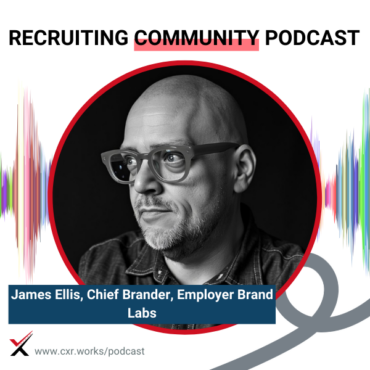
Building Trust in Talent Acquisition
How do you tell a compelling story with TA data? DaVita’s Nataliya Wilson shares how transparency and metrics align her team with patient care and business outcomes.
 play_arrow
play_arrow
Talent Chooses You: Reframing the Role of TA in Driving Growth Cami Grace
 play_arrow
play_arrow
Inside the Cox Career Site Redesign: Data, AI & Candidate Experience Cami Grace
 play_arrow
play_arrow
Vietnam TA/HR Delegation Recap Cami Grace
 play_arrow
play_arrow

Episode Overview:
Tracy Parsons shares her journey of applying agile methodology not just to software development, but to her life and work, creating a structured yet flexible approach to achieving personal and professional goals. The discussion also delves into the pitfalls of misaligned employer value propositions (EVPs) and the potential for a “lemon law” in recruiting to ensure honesty and integrity in the hiring process.
Key Topics Covered:
Living Life in Sprints: Tracy introduces the concept of structuring life and work in sprints, drawing from agile software development methodologies. She shares how this approach has allowed her to tackle projects and personal goals more effectively by breaking them down into manageable timelines.
The Agile Family: The episode takes a unique turn as Tracy describes how her family adopts agile principles for household management and personal development, including regular stand-ups and sprint planning to ensure everyone is aligned and accountable.
The Need for a Lemon Law in Recruiting: Tracy discusses her personal experience with a job that failed to meet the expectations set during the recruiting process. This leads to a broader conversation about the disconnect between EVPs and the actual working environment, highlighting the need for transparency and accountability in recruiting.
Proposals for Change: The dialogue shifts to potential solutions to the issues raised, including the importance of honest employer branding, the potential for contractual agreements in employment to protect both parties, and empowering candidates with better negotiation skills and knowledge.
Closing Notes:
The episode closes with a call to action for both employers and candidates to strive for authenticity, integrity, and empathy in their professional interactions. Tracy’s insights challenge the status quo of recruiting practices and encourage a more equitable and truthful approach to hiring and career development.
Title:
Red Flags & Lemon Laws: Calling Out Recruiting Mismatches
Featured Guests:
Tracey Parsons, Co-founder, Flockity and Work Drive
Hosts:
Chris Hoyt, President, CareerXroads
Gerry Crispin, Principal and Co-founder, CareerXroads
Episode Overview:
Tracey Parsons joins CXR to discuss a provocative idea: implementing “lemon laws” in recruiting. Drawing from personal experience and years in employer branding and candidate experience, Tracey calls for greater accountability when employers misrepresent roles or workplace culture. The conversation explores red flags in the hiring process, the gap between aspirational and actual EVPs, and the importance of candidate-employer transparency.
Key Topics:
Concept of “lemon jobs” and consequences for employer misrepresentation
The difference between aspirational and truthful EVPs
Warning signs candidates should watch for in interviews
Employer accountability vs. employee reputational risk
Global models for contract fairness (e.g., China’s term-based employment)
Practical ideas for improving transparency in recruitment
Notable Quotes:
“There should be consequences when companies misrepresent roles or cultures.” — Tracey Parsons
“If your EVP is only aspirational and not grounded in reality…it’s a lemon waiting to happen.” — Tracey Parsons
“Anything we ask of candidates, they should be allowed to ask of us.” — Tracey Parsons
“If there’s no time for you to ask questions in the interview—walk away.” — Tracey Parsons
“Companies are still buying ‘Best Places to Work’ badges. There’s no penalty for employers—only for employees.” — Tracey Parsons
Takeaways:
Recruiting must evolve toward mutual transparency and accountability. When companies overstate or misrepresent workplace realities, the cost falls unfairly on employees. Leaders must ensure their EVPs reflect the actual employee experience, and candidates should feel empowered to ask hard questions—and get honest answers.
Want more conversations like this?
Subscribe to the CXR podcast and explore how top talent leaders are shaping the future of recruiting. Learn more about the CareerXroads community at cxr.works.
Chris Hoyt: So, Tracy, you mentioned as we were getting started—and you and Jerry were talking—I need to hear a little bit more about this, but you mentioned this concept of living your life in sprints. And you’ve been through three already? Which… the math is mathing, and it’s only the end of March?
Tracey Parsons: I’m getting into the third sprint now. So Monday started the third sprint of the year. I’ve been developing software since the late 1900s—wrote my first website in ’95. I’ve been married to a brilliant software developer and building products for years. And up until this year, I’d just slog through life. There’s a sameness to life, and nothing annoys me more than sameness. So we started talking about it—what if we started living in sprints?
Chris Hoyt: Yeah.
Tracey Parsons: They’re usually based around some sort of milestone or travel. Sprint one was January—because January is literally the longest month of the year. Then there were six weeks leading to spring break, which was sprint two. And now post–spring break, we’ve got an eight-week sprint to my son graduating high school.
Chris Hoyt: I love that. How does that work at home? Is the whole family on the sprint?
Tracey Parsons: Yeah, absolutely. We’ve got sprint goals. It’s just like a tech sprint—user experience pieces, blockers, everything. Everyone knows what they’re supposed to be doing. We even have checkpoints.
Chris Hoyt: Tracy, every time I talk to you, I think—why aren’t you a TV show? I can just see you guys doing a huddle—Monday morning standup, talking about the feedback loop, and the kid saying, “I’m sorry, the UX in this last sprint sucked.”
Tracey Parsons: Yep. We talk about spinning plates. Everyone in my house has a lot of plates in the air, and when a plate’s about to fall, we say, “Hey, anybody want to pick this one up?” If nobody does, it’s clearly not important. It drops, and that’s fine.
Chris Hoyt: You’re just swiping left on the stuff nobody cares about.
Tracey Parsons: Exactly. We even have morning meetings—during our dog walks.
Chris Hoyt: I’d watch the pilot, at least.
Tracey Parsons: And then we go play with the horses. It’s a whole thing.
Chris Hoyt: It’s a whole thing. All right, are we ready to jump into our topic?
Announcer: Welcome to the CXR channel, our premier podcast for talent acquisition and talent management. Listen in as the CXR community discusses a wide range of topics focused on attracting, engaging, and retaining the best talent. We’re glad you’re here.
Chris Hoyt: All right, welcome to the Recruiting Community Podcast. Weekly insights and updates in the form of a conversation—it’s not terribly formal. I’m your host today, Rick Sanchez, and together with Morty Smith… just kidding. Today we’re exploring uncharted territories and challenging the norms of talent acquisition. And who better to join us than Tracy Parsons?
When we saw Tracy’s LinkedIn post—she’s the co-founder of Flockity and Work Drive—we knew we had to talk to her. Her take: there should be lemon laws in recruiting. A lot of EVPs aren’t honest or differentiated—and there are no consequences. So we’re diving into it.
We’re streaming on YouTube, Facebook, LinkedIn—maybe soon on Instagram, Twitch, TikTok, and eventually Blue Sky. You can always visit cxr.works/podcast for past and future episodes.
If you’re with us live on LinkedIn, jump in the chat—drop a question for Tracy or say hi.
And a reminder: this is an ad-free labor of love. Over 400 episodes in, and nobody gets paid to be here. But we do have a little housekeeping…
We want to share an update on the CXR Foundation, our nonprofit 501(c)(3). We raised nearly $34,000 last year—100% of that goes into programs. No board members are paid.
The foundation supports the CXR Inspire Scholarship, the Russ Mountain Scholarship, History of Recruiting, Diverse Suppliers Directory, TA Talk Tank mentoring, and CXR Cares. And we’ve got an open board seat—so reach out if you’re interested.
If you’d like to support the Foundation, you can use the QR code on screen or head to cxr.foundation.
Now, let’s bring in our guest… Tracy Parsons.
Chris Hoyt: Tracy, for those who haven’t had the pleasure—give us the elevator pitch. Who is Tracy Parsons?
Tracey Parsons: Well, the very first banner ad for recruiting on the internet—I placed that. So I’ve been doing this for a while. Started in consumer marketing and found my passion helping people find meaningful work.
I’ve been in employer branding, candidate experience, and recruitment marketing for over 20 years. I’m the grandchild of immigrants and the child of a factory worker. This is my mission—creating a more egalitarian relationship between employers and employees.
Chris Hoyt: That’s a great fun fact—first recruiting banner ad. Do you remember the pixel size?
Tracey Parsons: Oh yeah—super weird dimensions back then. And we were pulling candidates out of Usenet groups!
Chris Hoyt: Amazing. Okay, Tracy—you mentioned the idea of lemon laws in recruiting. Can you explain what you meant?
Tracey Parsons: I’ve had two official lemon cars—actual buybacks. So I know lemon laws. But more importantly, I once accepted a job where the candidate experience was perfect—great process, great interviews, great people. I asked all the right questions. I moved across the country for it. And it turned out to be nothing like what was promised.
It was a total bait-and-switch. The job, team, and culture were completely different. And it hit me—this was a lemon. I got a lemon job. There should be consequences when companies misrepresent roles or cultures. I think there should be a “lemon law” for work—if you’re misled, you get your money back.
Chris Hoyt: So in your perfect world—interim ruler of the planet—how would a recruiting lemon law work? What safeguards would you put in place?
Tracey Parsons: First, we need governance around developing EVPs. Too often, the EVP is aspirational without being real. I’ve done a lot of EVP work, and the problem comes when leadership fills in the holes with what they wish was true. It becomes a “right story” instead of a “true story.”
If your EVP is only aspirational and not grounded in reality or employee feedback—it’s a lemon waiting to happen.
Chris Hoyt: So these lemon experiences… are they the result of poor research, or is it more intentional?
Tracey Parsons: I don’t think it’s insidious. I think it starts with good intent. But once the research uncovers uncomfortable truths, layers of leadership intervene to “fix the narrative.” They fill in the gaps with gravel. They bury the truth. That’s when you lose credibility.
Gerry Crispin: I’ve always said candidates should ask, “How many people who look like me have you hired in the last five years, and where are they now?” But those questions don’t come up often.
Tracey Parsons: Exactly. And here’s something I really believe: anything we ask of candidates, they should be allowed to ask of us. If we ask for references, they should get references. They should be able to ask real questions and get real answers.
Chris Hoyt: But the power balance is skewed. Candidates are expected to give 4–6 weeks’ notice, but companies can cut you same-day.
Tracey Parsons: Exactly. And when I left that job after nine months, I got labeled the job-hopper. Meanwhile, they’re still buying “Best Places to Work” badges. There’s no penalty for employers—only for employees.
Gerry Crispin: There’s a model in China where professionals have contracts—one, two, or three years. If you part ways after the trial period, that’s fine. But if you terminate early, you pay out the contract. It’s an interesting model.
Chris Hoyt: Some leaders we’ve talked to are starting to negotiate short exits into their contracts now. If the company eliminates the role, they want guaranteed payouts.
Tracey Parsons: That’s fair. Because this keeps happening—and the candidate reputation suffers more than the employer’s. It’s not right.
Chris Hoyt: Let’s talk red flags. What should job seekers be watching for to avoid a bait-and-switch?
Tracey Parsons: If there’s no time for you to ask questions in the interview—walk away. That’s a huge red flag. The relationship should be symbiotic, not one-sided.
Gerry Crispin: I’ll bet you developed some sharper questions after that experience.
Tracey Parsons: Oh yes. Companies do not enjoy interviewing me now. I’ve learned how to dig deep.
Chris Hoyt: Tracy, if you were to write a book about this topic, what would the title be?
Tracey Parsons: Get the F** Out of Your Own Way.*
Chris Hoyt: And the subtitle?
Tracey Parsons: Don’t Be the Raisin in the Taco.
Chris Hoyt: Who gets the first signed copy?
Tracey Parsons: John Oliver.
Chris Hoyt: Perfect. Tracy, thank you so much for joining us today. It’s always a joy, and this conversation was a blast.
Tracey Parsons: Thanks for having me!
Chris Hoyt: All right, everyone—check out cxr.works/podcast for more episodes. We’ll see you next time.
Announcer: Thanks for listening to the CXR channel. Please subscribe on your favorite podcast platform and leave us a review. Learn more at cxr.works, facebook.com, and twitter.com/careercrossroads—and on Instagram at CareerXroads. We’ll catch you next time.
Tagged as: Employer Branding, Talent Acquisition, EVP, Recruiting, Podcast.
Chris Hoyt is the President of CareerXroads, a global peer community for talent acquisition leaders driving strategic change. With decades of experience leading recruiting innovation at Fortune 500 companies, Chris now advises enterprise TA teams on tech, process, and leadership. He’s a frequent speaker at conferences like SHRM, HR Tech, LinkedIn, and UNLEASH, and he’s known for pushing conversations beyond buzzwords to get to what really works in hiring. Through CXR, he connects top TA professionals to solve real problems, challenge norms, and shape the future of recruiting.

How do you tell a compelling story with TA data? DaVita’s Nataliya Wilson shares how transparency and metrics align her team with patient care and business outcomes.
